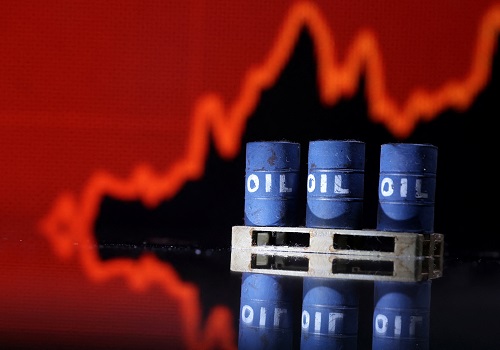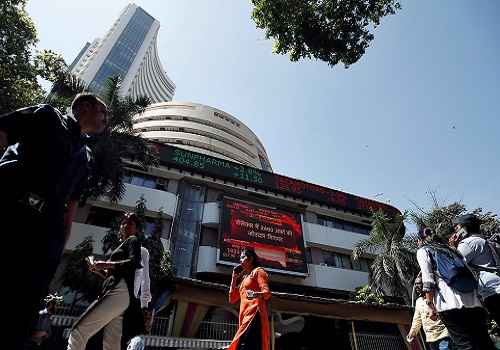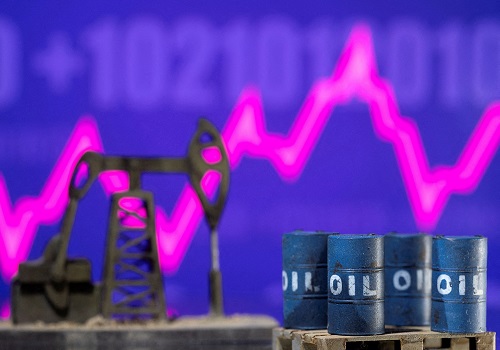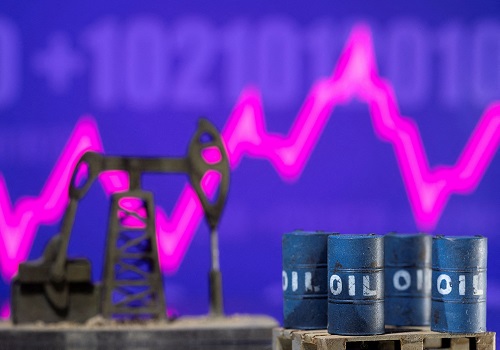Stocks, oil slide on Omicron, Biden plan setbacks
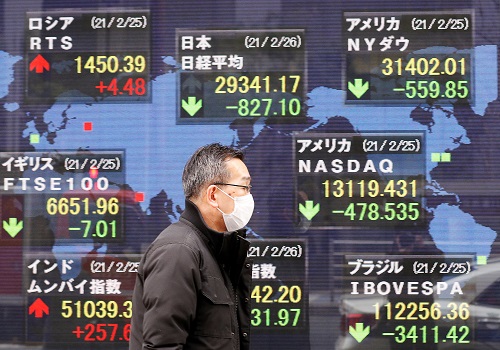
Follow us Now on Telegram ! Get daily 10 - 12 important updates on Business, Finance and Investment. Join our Telegram Channel
LONDON - U.S. stock futures and European stocks fell and oil slid 3% on Monday as surging Omicron COVID-19 cases triggered tighter curbs in Europe and a $1.75 trillion U.S. domestic investment bill suffered a potentially fatal blow.
The spread of the Omicron variant saw the Netherlands go into lockdown this weekend and put pressure on others to tighten restrictions.
Britain's cabinet will meet later on Monday as the country faces record cases, while the World Economic Forum postponed until mid-2022 its annual meeting which had been due to take place in the Swiss mountain resort of Davos in January.
Goldman Sachs cut its U.S. real GDP forecast for the first quarter of 2022, meanwhile, after U.S. Senator Joe Manchin, a moderate Democrat who is key to President Joe Biden's hopes of passing the investment bill, said on Sunday he would not support the package.
"Senator Manchin not supporting the President's fiscal package and Omicron spreading fast between them have lowered the tone for the start of the week and we have weaker equities, lower oil prices, lower bond yields and a stronger yen, dollar, and euro," said Kit Juckes, head of FX strategy at Societe Generale in London.
Thin pre-Christmas trading was likely to exacerbate market moves, he added.
S&P and Nasdaq futures fell 1%, pointing to a lower Wall Street open,
European and UK stocks hit two-week lows, and were down 1.3% and 1% respectively.
MSCI's index of Asia-Pacific shares outside Japan fell 1.7% to its lowest in a year and the world stocks index hit its lowest in nearly two weeks.
Emerging market stocks also hit their lowest in a year.
Beijing lightened the mood a little by cutting one-year loan rates for the first time in 20 months, though some had hoped for an easing in five-year rates as well.
The timing of the cut ahead of the Jan 1 interest rate resetting date for corporate loans was positive for corporate borrowers, JPMorgan analysts said.
Chinese blue chips still fell 1.5%, while Japan's Nikkei dropped 2.1%.
Oil prices dropped amid concerns the spread of the Omicron variant would crimp demand for fuel. [O/R]
Brent was down 2.6% at $71.58 a barrel, while U.S. crude lost 3.1% to $68.66 per barrel.
While coronavirus restrictions cloud the outlook for economic growth, they also risk keeping inflation elevated, prompting central banks to consider raising rates.
It was notable that Federal Reserve officials were openly talking of hiking rates as soon as March and of starting to run down the central bank's balance sheet in mid-2022.
That is earlier than implied by futures, which had been well ahead of Fed intentions until now. The market has only priced in a 40% chance of a hike in March, with June still the favoured month for lift off.
The Fed's hints of faster tightening, combined with safe-haven flows, underpinned the U.S. dollar index near its best for the year at 96.544, following a 0.7% jump on Friday.
The euro rose 0.27% to $1.1271, having shed 0.8% on Friday to threaten its low for the year. The dollar was steady at 113.62 yen.
Sterling fell 0.28% to $1.32 as Omicron worries erased all the gains made following the Bank of England's surprise rate rise last week.
Yields on U.S. 10-year notes were down at 1.387%, well below their 2021 top of 1.776%.
Ten-year German government bond yields fell to their lowest in nearly two weeks and were trading at -0.38%.
The Turkish lira hit a record low and was trading at 17.73 to the dollar on concerns over President Tayyip Erdogan's low interest rates economic policy and soaring inflation.
Chile's peso currency fell over 3% on Monday in pre-opening, after leftist Gabriel Boric comprehensively won the Andean country's presidential election on Sunday.
Gold was steady at $1,798 an ounce, having broken a five-week losing streak last week as equities slipped.
- U.S. stock futures and European stocks fell and oil slid 3% on Monday as surging Omicron COVID-19 cases triggered tighter curbs in Europe and a $1.75 trillion U.S. domestic investment bill suffered a potentially fatal blow.
The spread of the Omicron variant saw the Netherlands go into lockdown this weekend and put pressure on others to tighten restrictions.
Britain's cabinet will meet later on Monday as the country faces record cases, while the World Economic Forum postponed until mid-2022 its annual meeting which had been due to take place in the Swiss mountain resort of Davos in January.
Goldman Sachs cut its U.S. real GDP forecast for the first quarter of 2022, meanwhile, after U.S. Senator Joe Manchin, a moderate Democrat who is key to President Joe Biden's hopes of passing the investment bill, said on Sunday he would not support the package.
"Senator Manchin not supporting the President's fiscal package and Omicron spreading fast between them have lowered the tone for the start of the week and we have weaker equities, lower oil prices, lower bond yields and a stronger yen, dollar, and euro," said Kit Juckes, head of FX strategy at Societe Generale in London.
Thin pre-Christmas trading was likely to exacerbate market moves, he added.
S&P and Nasdaq futures fell 1%, pointing to a lower Wall Street open,
European and UK stocks hit two-week lows, and were down 1.3% and 1% respectively.
MSCI's index of Asia-Pacific shares outside Japan fell 1.7% to its lowest in a year and the world stocks index hit its lowest in nearly two weeks.
Emerging market stocks also hit their lowest in a year.
Beijing lightened the mood a little by cutting one-year loan rates for the first time in 20 months, though some had hoped for an easing in five-year rates as well.
The timing of the cut ahead of the Jan 1 interest rate resetting date for corporate loans was positive for corporate borrowers, JPMorgan analysts said.
Chinese blue chips still fell 1.5%, while Japan's Nikkei dropped 2.1%.
Oil prices dropped amid concerns the spread of the Omicron variant would crimp demand for fuel. [O/R]
Brent was down 2.6% at $71.58 a barrel, while U.S. crude lost 3.1% to $68.66 per barrel.
While coronavirus restrictions cloud the outlook for economic growth, they also risk keeping inflation elevated, prompting central banks to consider raising rates.
It was notable that Federal Reserve officials were openly talking of hiking rates as soon as March and of starting to run down the central bank's balance sheet in mid-2022.
That is earlier than implied by futures, which had been well ahead of Fed intentions until now. The market has only priced in a 40% chance of a hike in March, with June still the favoured month for lift off.
The Fed's hints of faster tightening, combined with safe-haven flows, underpinned the U.S. dollar index near its best for the year at 96.544, following a 0.7% jump on Friday.
The euro rose 0.27% to $1.1271, having shed 0.8% on Friday to threaten its low for the year. The dollar was steady at 113.62 yen.
Sterling fell 0.28% to $1.32 as Omicron worries erased all the gains made following the Bank of England's surprise rate rise last week.
Yields on U.S. 10-year notes were down at 1.387%, well below their 2021 top of 1.776%.
Ten-year German government bond yields fell to their lowest in nearly two weeks and were trading at -0.38%.
The Turkish lira hit a record low and was trading at 17.73 to the dollar on concerns over President Tayyip Erdogan's low interest rates economic policy and soaring inflation.
Chile's peso currency fell over 3% on Monday in pre-opening, after leftist Gabriel Boric comprehensively won the Andean country's presidential election on Sunday.
Gold was steady at $1,798 an ounce, having broken a five-week losing streak last week as equities slipped.












 320-x-100_uti_gold.jpg" alt="Advertisement">
320-x-100_uti_gold.jpg" alt="Advertisement">


